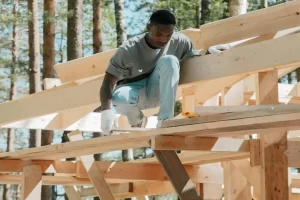Drywall finishers and framers are accountable for putting up, finishing, framing, and repairing drywall in residences and businesses. If you are interested in pursuing a career in drywall, you will likely require an interview for the job. In the interview, the HR Manager will ask questions to evaluate your experience and skills in drywall finishing. If you want to build your career in drywall, here are some frequently asked questions about drywall finishing and framing careers.
An occupation in drywall finishing requires a variety of abilities. It’s a physically taxing job that could involve new installation and repairing damaged walls and ceilings in existing rooms. You may need to learn how to read blueprints to comprehend what must be done for each task.
Mudding is often done throughout the job using a hand trowel and climbing ladders (and maybe even scaffolding) to reach all of the drywall that must be repaired. However, certain equipment simultaneously spreads the mud and tape, speeding up the process. To achieve the desired finish level after coating, sand the area as necessary and reapply the coating.
Throughout the week, the majority of drywall finishers work full-time. According to the BLS, the median salary in 2020 was about $59,000 annually. This specialism offers installers a higher salary than the average annual wage of $48,000. Finishers have a stable 10-year employment outlook as more senior professionals leave the sector.
The following are common qualifications for a drywall finisher:
An associate’s degree or a GED is often required for drywall finishers. Some employers might favor applicants who have successfully completed a drywall work installation technical school program. These courses usually span six to twelve months and include classroom instruction with practical training.
Most of the time, supervisors or other seasoned workers train drywall finishers on the job. The drywall finisher benefits from this training since it teaches them the specialized methods and techniques required for their position. Safety precautions, tool use, and specialized task-completion techniques may all be included in the training.

Certified drywall finishers can demonstrate their commitment to their job and their willingness to develop in their field by earning these credentials.
The following abilities are required of successful drywall service finishers.
A drywall finisher needs to be proficient in both cutting and shaping. These abilities are used while cutting and forming materials like drywall panels. A utility knife, a straightedge, and a miter saw are just a few examples of instruments that can be used to do this.
A building’s frame is constructed during the framing phase. To install the required framing for the drywall installation, drywall finishers frequently collaborate with framers. Using equipment like hammers, nails, and saws requires knowledge about how to do it.
The main drywall material is plaster, making it portable and lightweight. Finishers must understand the proper plaster mixing technique to guarantee that the drywall is sturdy and long-lasting. To accomplish this, you should understand how to apply plaster to walls properly and combine the dry and wet materials.
Because they use various tools and machines to do their work, drywall finishers must be able to operate machinery. This includes using machines to move drywall between construction sites and fastening it with power tools like nail guns.
To ensure they are ready for the next job, drywall finishers regularly clean their tools and workspaces. Cleaning up leftover building debris and drywall dust is part of this. They should also keep their personal items and work vehicles organized.
Even though no formal education is necessary to work as a drywall finisher, there are a few ways you may educate yourself to stand out in the competitive job market.
Before joining a program to complete work, employers typically need trainees to have a high school diploma or GED. Concentrating on math and shop classes would be wise if you’re still working on this level.
An apprenticeship or a trade school certificate will probably be required before you start working as a full-time drywall installation and fixing. In an apprenticeship program, you’ll train under a seasoned finisher for two to three years. The job is paid and may result in a permanent post. Check out the apprenticeship programs offered by construction companies or by unions.
Under the guidance of a journeyperson, a certified drywall finisher, an apprentice will get both classroom instruction and on-the-job training. While working on the job site as an apprentice, you are compensated per hour while learning. A journeyperson’s hourly rate serves as the starting point for wages, which rise throughout the apprenticeship until you are paid at full rate.
There are various drywall finisher apprenticeship training programs in the USA. These four-year programs typically include technical instructions in classes and on-the-job training. Less time is needed to complete your apprenticeship if you have relevant job experience or have finished a drywall finisher program at a college or technical institute.
You could also sign up for a two-year program at a trade school. There is no requirement for this, but the additional certification or associate’s degree may enable you to launch your own firm or advance your work. It’s possible that there aren’t any drywall-specific programs available, but you can still develop the skills necessary to be a finisher by concentrating on a general contractor track.
The duties of a drywall finisher might include a variety of things.
Read More